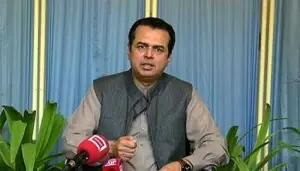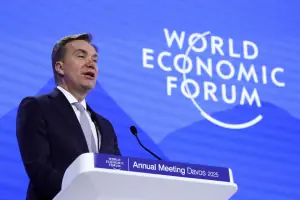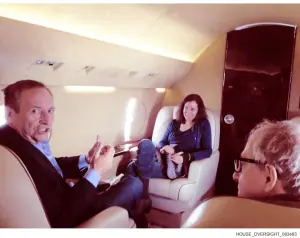Promoting tourism in Pakistan: lessons from Dubai
5 min readBy Bilal Memon
KARACHI: A successful partnership between the public and private sectors that results in driving the promotion of tourism is key behind Dubai’s success as a top destination, said Issam Kazim, chief executive officer of one of the government entities mandated to make it happen.
In a recent interview with Business Recorder, Kazim – in response to a query on Pakistan tourism and lessons it could learn – said there has been an “amazing partnership” between the public and private sectors in Dubai, which has helped the emirate’s evolution from being a trading hub to becoming one of the most visited cities in the world.
“As a government department, we are driving the private sector forward, as opposed to the other way around that would be the case globally,” Kazim, chief of Dubai Corporation for Tourism and Commerce Marketing (DCTCM), told Business Recorder. “This hunger to ensure we are pushing to become the number one destination is what drives us.”
The DCTCM was established in December 2013 as an affiliate of Dubai’s Department of Tourism and Commerce Marketing (Dubai Tourism), and is responsible to promote the emirate’s vision to become the most visited city in the world.
It attracted a record 16.7 million overnight visitors in 2019, a 5.1% year-on-year growth in volume, according to figures published in the Dubai Tourism annual report for the year, putting it among the most-visited cities in the world behind Bangkok, London, and Paris. Visitors from Pakistan contributed 3% to the overall number, putting it in ninth place among the top 10 source markets for Dubai tourism.
The number dropped to 5.5 million visitors the following year as the coronavirus pandemic hit the tourism sector, but a gradual recovery is now putting Dubai at the forefront again.
It is currently hosting the six-month Expo 2020 Dubai, a trade fair that will run until March 2022 and has seen more than seven million visits since it opened on October 1. Travel also increases at the end the year, with Dubai now gearing up for New Year’s celebrations as the global economy looks to take charge against the pandemic with vaccination. Just a couple of months ago, the UAE also hosted the ICC T20 World Cup, attracting a massive influx of tourists from South Asia.
The recovery for Dubai is crucial as the economy of the Middle East trade, finance, and tourism hub shrank 10.9% last year, with the coronavirus-driven drop in tourism contributing to 56% of the overall decline, S&P Global Ratings said in a report in October 2021.
“Tourism’s contribution to real GDP fell to about 13% in 2020, from 18% in 2019,” the report added.
While lower in comparison, the contribution is a far cry from tourism’s role in Pakistan’s economy that stood at a meagre 5.9% even in 2019, according to one official estimate.
Kazim said Dubai’s evolution from a trade hub helped it open to other markets, helping the emirate in its journey as a tourist destination.
“We were always built on trade. We are one of the largest port operators in the world now. Same goes for our airports,” added the CEO, referring to Dubai’s airport that welcomed over 86 million passengers in 2019, surpassing London’s Heathrow as the busiest airport in the world.
In comparison, all of Pakistan’s airports combined handled around 20 million passengers between July 2018 and June 2019, according to statistics of the country’s Civil Aviation Authority.
“This shows the value an airport brings to the table. These two aspects (public-private partnership and airports) play a key role – from a business and logistics side of things to connectivity and bringing people into Dubai.”
Kazim said the scope of Dubai has gradually widened, but the private sector was always on-board, working in tandem as the emirate evolved from being just a trading hub to a global business headquarter as well.
“The private sector also creates the opportunities that we can leverage.
“But we are also establishing a business side of things as well, to position Dubai as just not a trading hub, but also ensure that businesses set up shop here.
“With that, we eased regulations and policies as well, including visas. If there is a regional headquarter in Dubai, it must be easier for them to bring in team members from all around the world.”
The visa policies, introduced at different times including some ease of access during the pandemic, are targeted at different segments of the market including post-retirement, freelance, and remote-working.
Kazim said the entire model from ease of access to connectivity make up the infrastructure that are “simple building blocks” that attract people.
“What also plays a big role is also the visit of families and friends.”
While tourism remains susceptible to a global recession, and was among the worst-hit during the pandemic, many believe the industry carries massive potential in Pakistan.
Additional footfall benefits several sectors, including aviation, retail, and transport, provided a country is able to handle the higher number.
Hasaan Khawar, Special Assistant to Chief Minister Punjab on Information & Special Initiatives, Tourism and Parks & Horticulture Authorities, said Pakistan can learn a great deal from Dubai.
“Tourism is promoted through investment, and this happens with contribution from the private sector. Dubai’s public-private partnership is an example to follow, from investment policies to regulations,” Khawar told Business Recorder.
“We also need to learn from Emirates airline. People feel tourism is promoted first, and then air travel starts. In Dubai, it was the other way around,” added Khawar, referring to Kazim’s earlier comment that connectivity played a key role in promoting Dubai’s tourism mandate.
Khawar also stressed that while tourism remains important, it has to be managed sustainably in Pakistan. “We need to promote it in an eco-friendly, sustainable manner. The balance has to be achieved.”
The official said Pakistan has potential to promote cultural and religious tourism, stressing on ease of access through better visa policies and investment from the private sector.
Meanwhile, Kazim said Dubai’s aim is not just to be the most visited city, but also the most liveable, targets that will go hand-in-hand as it recovers from the pandemic.
This article first appeared in Business Recorder on December 22, 2021
For the latest news, follow us on Twitter @Aaj_Urdu. We are also on Facebook, Instagram and YouTube.
























Comments are closed on this story.